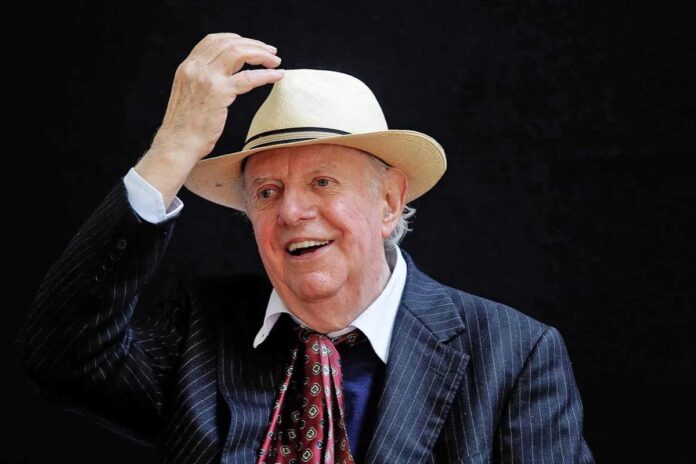Dario Fo (1926–2016) was a prolific Italian playwright, actor, theatre director, stage designer, and political campaigner, known for his left-wing political views. In 1997, he was awarded the Nobel Prize in Literature for his work, which made him one of the most widely performed contemporary playwrights in global theatre. Fo’s plays were often marked by improvisation and a commitment to reviving “illegitimate” forms of theatre, drawing inspiration from the medieval giullari (strolling players) and the commedia dell’arte tradition, a popular form of improvisational theatre with roots in Italy. His works, which combined satire, political commentary, and farce, made a significant impact on the theatre world, influencing both the content and the form of modern plays.
Introduction
Dario Fo wasn’t just a playwright—he was a force of nature in the world of theatre. His unique blend of humor, political satire, and social commentary changed the way theatre was perceived globally. With a style that combined slapstick, improvisation, and sharp critique, Fo’s works resonated with audiences far beyond Italy. A Nobel laureate, his plays tackled important issues ranging from corruption to social injustice, all while captivating viewers with laughter. In this article, we’ll explore Dario Fo’s life, his revolutionary theatre, and the enduring impact he made on the world stage.
Who Was Dario Fo?
Early Life and Education
Born on March 24, 1926, in Sangiano, Italy, Dario Fo was raised in a country rife with political turmoil. Growing up during World War II, he was exposed to a world of social and political conflict, which would later influence his creative work. Fo studied at the Brera Academy in Milan, where his early education in visual arts, along with a keen sense of observation, sparked his interest in performance and storytelling.
Career Beginnings
Fo’s career began in theatre, where he worked as both an actor and a playwright. However, it wasn’t until the 1960s that he gained major recognition, thanks to his breakthrough play Accidental Death of an Anarchist. His satirical and often absurd takes on societal issues caught the attention of audiences and critics alike. Over the next several decades, Fo would cement his place as one of the most innovative and daring playwrights of his time.
The Revolutionary Theatre of Dario Fo
Political Satire and Humor
At the heart of Dario Fo’s work was his ability to use humor to critique the powerful. His plays often mocked politicians, the church, and the aristocracy, pointing out the hypocrisies and injustices of those in charge. Fo’s comedic timing, combined with sharp social commentary, turned his theatre into a form of protest. His works were not just entertaining—they were designed to provoke thought and challenge the status quo.
Popular Works
Fo’s catalogue includes some of the most important and impactful plays of the 20th century. Here are a few of his most celebrated works:
- Accidental Death of an Anarchist (1970): This absurdist play critiques police corruption and the misuse of power, focusing on the story of an anarchist who falls to his death under questionable circumstances.
- Mistero Buffo (1969): One of his most famous works, Mistero Buffo is a one-man show that reinterprets traditional medieval mystery plays through the lens of contemporary politics and social issues.
These plays, among others, solidified Fo’s reputation as a daring playwright who wasn’t afraid to confront societal issues head-on.
Dario Fo’s Impact on Modern Theatre
Breaking Traditional Boundaries
Dario Fo was a master of breaking traditional theatre conventions. He brought a sense of chaos and unpredictability to the stage, where anything could happen. His use of improvisation, slapstick comedy, and an often non-linear structure made his plays accessible to audiences of all backgrounds. Fo believed that theatre should not be confined to the elites but should be for the masses—a place where people could both laugh and reflect on serious issues.
Global Influence
Fo’s works transcended Italy, and his influence spread across the globe. His plays were translated into numerous languages and performed in theatres worldwide, from the United States to Japan. The accessibility of his work—blending humor, political critique, and universal themes—made it easy for people of different cultures to connect with his message. Today, his impact is still felt in global theatre, where his work continues to inspire new generations of playwrights and performers.
Dario Fo’s Nobel Prize: Why Did He Win?
Recognition of His Work
In 1997, Dario Fo was awarded the Nobel Prize in Literature for his “work which is rich in the field of dramatic art and his commitment to human rights.” The Nobel committee recognized his ability to combine dramatic art with political protest, highlighting his contribution to the world’s understanding of the role of art in social change.
Fo’s Nobel win marked a significant moment for political theatre, drawing attention to the power of plays to challenge the established order. It also placed the often-overlooked genre of comedic theatre in the spotlight, showing that humor and satire could be just as impactful as more traditional forms of drama.
Legacy
Dario Fo’s legacy extends beyond his Nobel Prize. His influence on modern theatre is undeniable, and his approach to theatre as a form of activism continues to inspire writers, directors, and performers today. By combining art with social conscience, Fo proved that theatre could be a powerful tool for transformation.
Dario Fo’s Philosophy: Art as Protest
Art with a Message
For Fo, theatre was never just about entertainment. He saw it as a powerful vehicle for change—something that could shake people out of their complacency and inspire them to think critically about the world. His works often confronted uncomfortable truths about society, and his satirical style made these issues accessible to a wide audience. Whether discussing corruption, war, or the plight of the working class, Fo used his art to challenge the powers that be.
Personal Beliefs and Activism
Fo was not only a playwright but also a political activist. Throughout his life, he supported various causes, including anti-globalization movements and campaigns for human rights. His commitment to social justice was evident in his work, which often pushed for change in both Italy and the wider world.
FAQ Section
What were Dario Fo’s most famous plays?
Some of Dario Fo’s most famous works include Accidental Death of an Anarchist, Mistero Buffo, and The Pope and the Witch. These plays are known for their political satire, humor, and social commentary.
Why did Dario Fo win the Nobel Prize?
Dario Fo was awarded the Nobel Prize in Literature in 1997 for his contributions to dramatic art and his commitment to human rights, recognizing his ability to blend comedy with political critique.
How did Dario Fo influence modern theatre?
Fo’s use of humor, satire, and unconventional storytelling broke new ground in theatre. He made theatre accessible to the masses and used it as a platform for social and political protest, influencing playwrights worldwide.
What is the legacy of Dario Fo?
Dario Fo’s legacy is marked by his ability to combine entertainment with activism. His works continue to inspire playwrights and performers, and his influence on global theatre is still felt today.
Final Thoughts
Dario Fo’s work is a reminder of the power of theatre to challenge, provoke, and inspire. Through his sharp wit, political commentary, and groundbreaking storytelling, Fo transformed the way we think about theatre. His legacy continues to live on, reminding us that art is not just for entertainment—it’s a tool for social change and a voice for the voiceless.




